Do you have a picture under white lights? I dunno but it looks an awful lot like dinos.
Navigation
Install the app
How to install the app on iOS
Follow along with the video below to see how to install our site as a web app on your home screen.
Note: This feature may not be available in some browsers.
More options
You are using an out of date browser. It may not display this or other websites correctly.
You should upgrade or use an alternative browser.
You should upgrade or use an alternative browser.
Algae Control Identification and Help
- EMERGENCY
- Thread starter harsha22
- Start date
-
- Tags
- algae ugly phase
- Tagged users None
Not to beat a dead horse, but YOUR TANK IS ONLY 2 MONTHS OLD!In case it is cyano, are regular water changes the only answer or should I any product?
Let it be for the moment!
sixty_reefer
5000 Club Member
View BadgesArticle Contributor
UK Reef Club Member
Hospitality Award
305 Reef Club
R2R Research
Those pictures are still blue, unfortunately we need them under white light to be able to make any determination, we also need to know what your phosphates are as they can indicate if you have diatoms, dinoflagellates or Cyanobacteria. The only expected in a new reef is diatoms. Everything else will need addressing as time won’t resolve it on its ownIt is definitely dark brown in color.
sixty_reefer
5000 Club Member
View BadgesArticle Contributor
UK Reef Club Member
Hospitality Award
305 Reef Club
R2R Research
You will need to do some changes if it’s dinoflagellates or Cyanobacteria, depending on what you have. Although we can’t help you without pictures under whites and your phosphates analysis.In case it is cyano, are regular water changes the only answer or should I any product?
sixty_reefer
5000 Club Member
View BadgesArticle Contributor
UK Reef Club Member
Hospitality Award
305 Reef Club
R2R Research
How come? The only thing that is unavoidable is diatoms if dead rock and dead sand is chosen to cycle a system, Cyanobacteria and dinoflagellates are nutrient management related issues and will only occur if a tank has a nutrient imbalance in any stage of its life not necessarily just during the first few months.Actually, while not every new tank goes through a cyano stage, to say it's "not normal or part of" the process of a maturing tank is inaccurate.
I think it is cyano. It took pics under white light. Suggestions for fix?You will need to do some changes if it’s dinoflagellates or Cyanobacteria, depending on what you have. Although we can’t help you without pictures under whites and your phosphates analysis.
Attachments
-
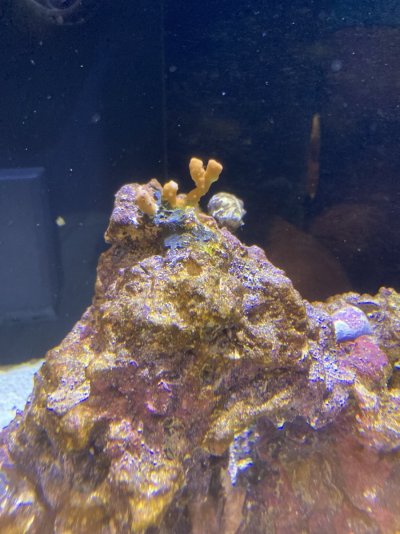 EB454A20-50B2-4B52-80F3-7902965D437D.jpeg204.9 KB · Views: 56
EB454A20-50B2-4B52-80F3-7902965D437D.jpeg204.9 KB · Views: 56 -
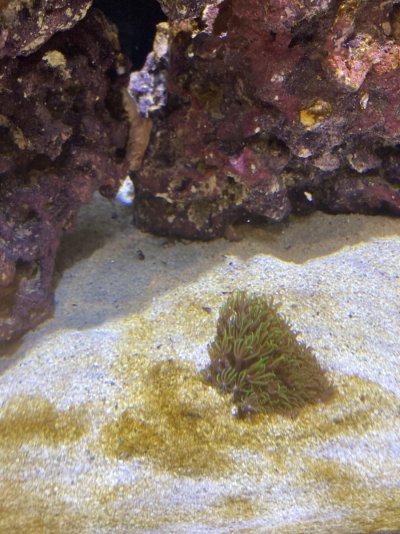 543F7010-4860-47DB-8C80-917F1778BFAC.jpeg226.9 KB · Views: 49
543F7010-4860-47DB-8C80-917F1778BFAC.jpeg226.9 KB · Views: 49 -
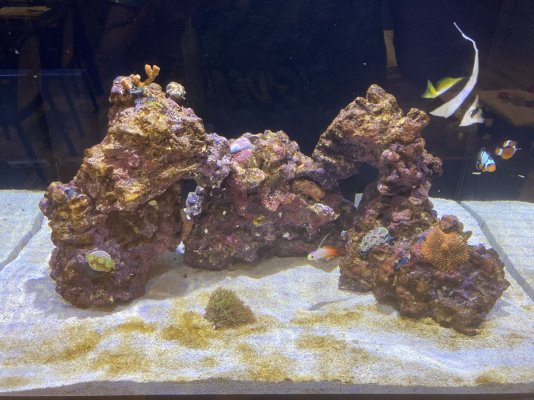 525B679B-F44C-4385-A181-B6D9ACCA6D10.jpeg257.1 KB · Views: 48
525B679B-F44C-4385-A181-B6D9ACCA6D10.jpeg257.1 KB · Views: 48 -
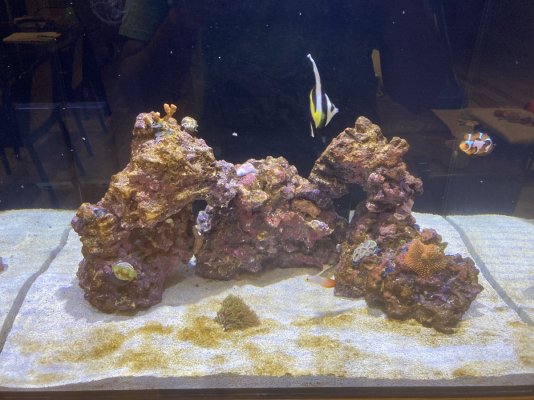 6A887496-E8DF-4B1D-ADB4-B6E908CCD2DA.jpeg239.9 KB · Views: 51
6A887496-E8DF-4B1D-ADB4-B6E908CCD2DA.jpeg239.9 KB · Views: 51 -
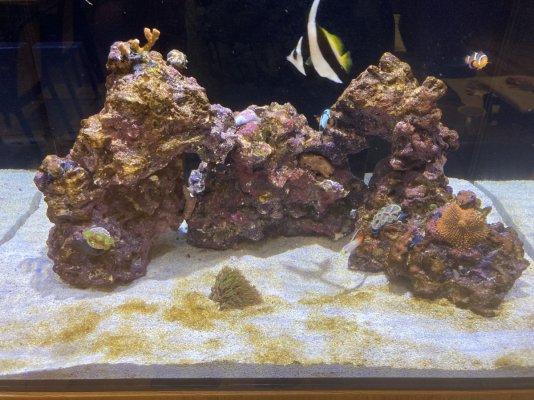 EFB95A18-D61B-4E13-8FBE-225B952CF45F.jpeg269 KB · Views: 58
EFB95A18-D61B-4E13-8FBE-225B952CF45F.jpeg269 KB · Views: 58
vetteguy53081
Well known Member and monster tank lover
View Badges
Partner Member 2024
Excellence Award
Reef Tank 365
RGB
Article Contributor
Tampa Bay Reef Keepers
West Palm Beach Reefer
Hospitality Award
Ocala Reef Club Member
305 Reef Club
Wisco Reefers
Midwest Reefer
Fish Medic
MAC of SW Florida
Rock Pool Reef Keepers
R2R Secret Santa 2023
My Tank Thread
My Aquarium Showcase
This is classic diatoms which are a brown algae that typically appear in a reef tank that has just completed its cycle but they can also appear in an established reef tank. They can cover sand, rock, pumps, glass, you name it. Diatoms look ugly but in most cases they are harmless so the key is to not panic when they appear.
Diatoms feed mainly off of silicates but also consume dissolved organic compounds, phosphate and nitrates. Unfiltered tap water can contain silicates and is a good way to jump start a bloom if you use it to mix salt or to replace water that evaporated from the tank. The best way to prevent this from happening is to filter water through a RODI unit, although you can still get a diatom bloom when using RODI if the cartridge that removes silicates expires.
Diatoms are typically harmless to a captive reef and can be beaten once their food source expires. Once you put the kibosh on the source, the outbreak should last a couple of weeks so just be patient and it will pass.
For major outbreaks you may want to consider the three day blackout. Diatoms are easily wiped from the glass with a mag float, a turkey baster or a toothbrush can access other areas of the tank. Be prepared for them to re-establish themselves quickly, they are likely to be able to resettle and have exponential growth rates.
To prevent their return, practice good aquarium husbandry by doing regular water changes, keep the substrate clean, don’t overfeed the fish, ensure your skimmer is running at an optimal level and rinse out filter socks and sponges on a regular basis.
Some cleaner crew to help control it are : Cerith snails, Nerite snails and Trochus snails and also Astraea snails are effective at removing diatoms.
Diatoms feed mainly off of silicates but also consume dissolved organic compounds, phosphate and nitrates. Unfiltered tap water can contain silicates and is a good way to jump start a bloom if you use it to mix salt or to replace water that evaporated from the tank. The best way to prevent this from happening is to filter water through a RODI unit, although you can still get a diatom bloom when using RODI if the cartridge that removes silicates expires.
Diatoms are typically harmless to a captive reef and can be beaten once their food source expires. Once you put the kibosh on the source, the outbreak should last a couple of weeks so just be patient and it will pass.
For major outbreaks you may want to consider the three day blackout. Diatoms are easily wiped from the glass with a mag float, a turkey baster or a toothbrush can access other areas of the tank. Be prepared for them to re-establish themselves quickly, they are likely to be able to resettle and have exponential growth rates.
To prevent their return, practice good aquarium husbandry by doing regular water changes, keep the substrate clean, don’t overfeed the fish, ensure your skimmer is running at an optimal level and rinse out filter socks and sponges on a regular basis.
Some cleaner crew to help control it are : Cerith snails, Nerite snails and Trochus snails and also Astraea snails are effective at removing diatoms.
This is not true. Cyano and dinos can resolve as the tank stabilizes.Those pictures are still blue, unfortunately we need them under white light to be able to make any determination, we also need to know what your phosphates are as they can indicate if you have diatoms, dinoflagellates or Cyanobacteria. The only expected in a new reef is diatoms. Everything else will need addressing as time won’t resolve it on its own
Then you don't understand the processes at work in a new tank. Are cyano and dinos always going to appear? No. But all kinds of things can happen in a new tank as it's still maturing and finding bacterial/archeal balance, and the appearance of dinos, cyano, other algaes, bacterial blooms, etc can be short-lived and often need no significant intervention.How come? The only thing that is unavoidable is diatoms if dead rock and dead sand is chosen to cycle a system, Cyanobacteria and dinoflagellates are nutrient management related issues and will only occur if a tank has a nutrient imbalance in any stage of its life not necessarily just during the first few months.
There is a wealth of information about this process already on this forum, including in the sticky threads, so I'm not inclined to do your homework for you. But for any new reefer reading this thread, I feel it's warranted to refute your claim that "The only expected in a new reef is diatoms. Everything else will need addressing as time won’t resolve it on its own".
Last edited:
Even if it is cyano .In case it is cyano, are regular water changes the only answer or should I any product?
carbon dosing or dosing anything for that matter that can’t be tested the need for is pointless and reckless .
take the time to let it naturally mature without adding the cocktail of mixed chemicals
@sixty_reefer , here's a good place for you to start...
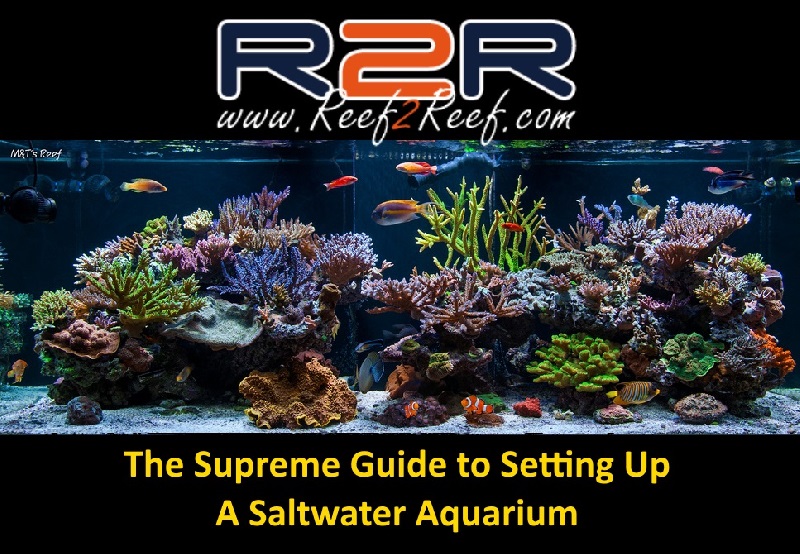
 www.reef2reef.com
www.reef2reef.com
The Supreme Guide To Setting Up A Saltwater Reef Aquarium
This article was sponsored by @MarineDepot at www.marinedepot.com. Introduction The marine environment is one of the most complex systems on the planet. The aquarium you are about to set up is only a tiny sliver of the vast ocean, but it is no...
 www.reef2reef.com
www.reef2reef.com
I am sorry I do not agree your nitrates and phosphates are what you should be watching. If you are below .15 phosphates let it ride if you go over that change water to bring down. Do not deplete your nitrates and phosphates it will lead to dinos witch is worse than cyano. The bacteria you need in your tank need the phosphates and nitrates to take hold of your rock.
For the yellow tint run some activated carbon in a bag or reactor.
sixty_reefer
5000 Club Member
View BadgesArticle Contributor
UK Reef Club Member
Hospitality Award
305 Reef Club
R2R Research
It’s a very large sponsored article from 2013 that only touches briefly in Cyanobacteria quote from the article “it will go away on its own” we know better today that it won’t just go away in fact it can become so bad that in some situations only with the aid of antibiotics it can be removed also a fact@sixty_reefer , here's a good place for you to start...

The Supreme Guide To Setting Up A Saltwater Reef Aquarium
This article was sponsored by @MarineDepot at www.marinedepot.com. Introduction The marine environment is one of the most complex systems on the planet. The aquarium you are about to set up is only a tiny sliver of the vast ocean, but it is no...www.reef2reef.com
sixty_reefer
5000 Club Member
View BadgesArticle Contributor
UK Reef Club Member
Hospitality Award
305 Reef Club
R2R Research
It seems that you may have been watching Ryan presentation although you may not have understood the message. Can you define tank stabilisation by your own words? Can you have that without nutrients control and management?This is not true. Cyano and dinos can resolve as the tank stabilizes.
That is brilliant advice!Please just slow down!
First, not at all an emergency. That tag is used for when someone needs help immediately to try to keep a fish from dying, etc.
Second, you've made quite a few posts about different "problems" that are simply the things that happen with a new tank.
Don't expect a saltwater aquarium to look "great" until it's a year old, and then you'll be pleasantly surprised if it stabilizes sooner than that.
You WILL get algae. ALL KINDS of algae. The tank has to mature and go through multiple cycles -- the nitrogen cycle that makes the water safe for fish and inverts is just the beginning.
You're welcome to throw every chemical/product you want into your tank in an attempt to avoid the natural process, but will literally just be throwing money away.
Slow down and enjoy and learn from the experience. Nothing good happens fast in this hobby.
Cheers!
Similar threads
- Replies
- 16
- Views
- 264
- Replies
- 7
- Views
- 163
- Replies
- 6
- Views
- 121
-
- Question
- Replies
- 69
- Views
- 2,321


















